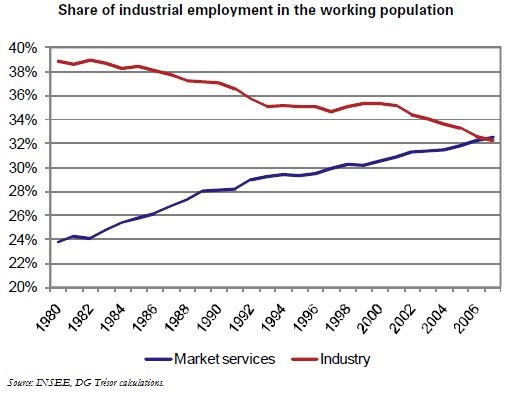Trésor-Economics No. 77 - The decline in industrial employment in France (1980-2007): how to account for it?
The decline in industrial employment has affected France like many of the developed economies. It can be pictured in the light of three concomitant trends over the period 1980-2007, namely the decline in industrial employment, a fall in this sector's contribution to GDP and, in parallel, strong growth in the market services sector.
French industrial employment fell from 5.3 to 3.4 million jobs over the period 1980-2007, a decline of 36%. Industry's share of total employment fell by 11 percentage points, from 24% to 13%, while market services increased by 12 percentage points (from 32% to 44% of the working population) over the same period. This study assesses the main structural determinants of this phenomenon in France over the period 1980-2007, identifying three key factors.
A not insignificant portion of the fall in industrial employment is explained by far-reaching changes in the production system. A feature of this has been growing use of the outsourcing of production activity from the industrial sector to the services sector. The accompanying fall in industrial employment thus appears to be artificial, insofar as it merely reflects a transfer of previously industrial jobs to the services sector, with no real change in their content. These job transfers are estimated at 25% of the industrial jobs lost over the period 1980-2007.
Another portion of the jobs lost is explained by distortions in the structure of demand over time, and by productivity gains in the economy. This effect is transmitted via two main channels. First, productivity gains achieved throughout the economy boost agents' incomes; in developed economies, this leads to a shift in the structure of household spending in favour of services to the detriment of industrial goods. Its "structural" character does not mean that it is irreversible, and the capacity of manufacturers to offer new products will be a crucial factor. Second, the productivity gains achieved in industry reduce the need for manpower in this sector. For sure, these productivity gains lead in return to a fall in the price of industrial goods and, in consequence, to a rise in the demand for them, but this effect only partially offsets the initial impact in terms of reduction in manpower, given the limited substitutability between these products and other goods in the economy. These effects are thought to account for nearly 30% of the job losses observed.
Foreign competition too seems to have contributed to the decline in industrial employment in France. At a minimum this would explain 13% of job losses over the period 1980-2007, and 28% over the period 2000-2007. These findings need to be treated with a degree of caution. Here too, once again, these job losses are not irreversible.
